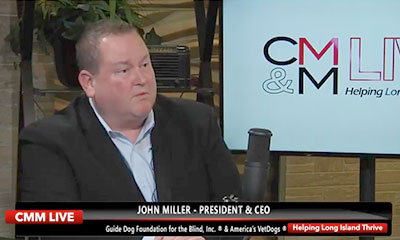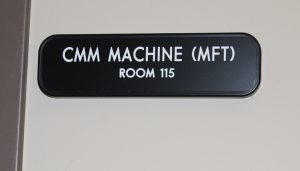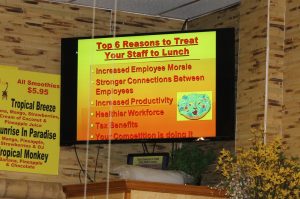![]()
We’re all familiar with the adage “If you do what you love, you’ll never work a day in your life.” Don Catalano, President and CEO of iOptimize Realty®, has really taken this message to heart: he’s seamlessly combined his passion for real estate, photography, and piloting airplanes into a rewarding career at the helm of one of Long Island’s most innovative companies.
A longtime client and friend of Campolo, Middleton & McCormick, Catalano recently invited Managing Partner Joe Campolo to the Commack headquarters of iOptimize Realty® for lunch and a demo of Catalano’s REoptimizer® software, a real estate optimization tool and commercial lease management software. Over sandwiches from the Sexy Salad, these business leaders and military veterans discussed what sets iOptimize apart and how their military service has shaped their leadership style.
Many companies offer commercial real estate services, but iOptimize is unique in exclusively representing corporate tenants. The concept was born when Catalano saw a gap in the market: corporate tenants, needing to renegotiate leases or look for new space only every five years or so, often assign the task to their CFOs. But these time-pressured CFOs, no matter how brilliant they may be, simply lack the experience to compete with real estate brokers who live and breathe the market year-round. To level the playing field, Catalano created iOptimize to serve as the corporate tenant’s expert and shoulder the due diligence burdens of finding and negotiating for space. Most brokers work for landlords, Catalano explains, making his approach incredibly different.
To start the process, Catalano spends time getting to know his clients, learning not just where they’re interested in leasing but what else they value – do they want buildings with amenities? Do they need hotels and restaurants nearby? iOptimize then serves as a fact-finder, presenting clients with dozens more options than traditional brokers who might be bound by exclusivity arrangements with landlords. This approach encourages landlords to compete for the tenant’s business, often saving the tenant up to 30 percent. But landlords benefit, too: iOptimize represents only creditworthy tenants, so landlords breathe easier when they see iOptimize at the table.
As a young man, Catalano joined the military seeking a challenge. He ultimately served in the U.S. Army Special Forces, undergoing high-altitude low-opening (HALO) parachuting training and scuba training. Catalano was elite within the elite, completing arduous training few could finish. Catalano says that the experience taught him that “you can have fear but you have to push through it and overcome it” – a lesson he now applies to business.
Perhaps it’s this extraordinary background that pushed Catalano to make iOptimize even more innovative and serve clients even better by translating his love of flying and photography into an additional client benefit. An accomplished pilot, Catalano flies his plane over potential sites and takes stunning aerial shots, offering clients a bird’s-eye view of potential properties. These photos give clients the invaluable opportunity to see everything they can’t readily see from the ground, such as structural systems, the condition of a roof, and environmental issues. Catalano’s photos of buildings representing some of the largest deals on Long Island line the walls of his office including Allstate, DealerTrack, and Sbarro. (iOptimize works all over the country, and Catalano is arguably the most licensed real estate professional in the industry.)
 In his quest to deliver perfection in the client experience – another lesson he attributes to his military service – Catalano has also worked with his team to develop REoptimizer®, proprietary software to aid in the fact-finding process. The web-based program is a global system in multiple currencies designed for corporate users, allowing side-by-side comparisons in the market. Explaining that real estate is often underfunded and understaffed in the corporate setting, Catalano says that REoptimizer® was designed not only to save clients money but also to help them better utilize space, renegotiate leases, and find the ideal space based on their unique preferences. The program also helps clients manage existing leases by keeping track of deadlines and documents in one place, saving significant administrative burden. By putting the client in control of the process, REoptimizer® is a natural extension of the iOptimize way of servicing clients.
In his quest to deliver perfection in the client experience – another lesson he attributes to his military service – Catalano has also worked with his team to develop REoptimizer®, proprietary software to aid in the fact-finding process. The web-based program is a global system in multiple currencies designed for corporate users, allowing side-by-side comparisons in the market. Explaining that real estate is often underfunded and understaffed in the corporate setting, Catalano says that REoptimizer® was designed not only to save clients money but also to help them better utilize space, renegotiate leases, and find the ideal space based on their unique preferences. The program also helps clients manage existing leases by keeping track of deadlines and documents in one place, saving significant administrative burden. By putting the client in control of the process, REoptimizer® is a natural extension of the iOptimize way of servicing clients.
Learn more about this forward-thinking Long Island company at http://www.ioptimizerealty.com/ and check out REoptimizer® at http://www.reoptimizer.com/. You can also view a clip from Joe Campolo’s recent CMM Live interview with Don Catalano at https://www.youtube.com/watch?v=Kdor7LeGLPs.


CMM client and friend Don Catalano, President and CEO of iOptimize Realty®, recently welcomed CMM Managing Partner Joe Campolo to his beautifully designed headquarters on Vanderbilt Motor Parkway in Commack. Next photo: Catalano served in the U.S. Army Special Forces, undergoing high-altitude military parachuting (HALO) training as well as scuba training. Photos and keepsakes from his service line the shelves of his office.


A shelf of trophies, awards, and memorabilia in Catalano’s office. Next photo: Model airplanes on display. Catalano is an accomplished pilot who puts his flight skills to work for his clients, taking aerial shots of prospective properties to explore the location from all angles.


Catalano in his office. Next photo: These military veterans credit their service with shaping them into Long Island business leaders.


Catalano and colleagues welcomed Campolo to the office. Rich Boccard and Jason Brucella are responsible for iOptimize’s active social media presence as well as working with REoptimizer®, a real estate optimization tool and commercial lease management software that takes the pain out of real estate while saving customers money and time. Next photo: Catalano shows Campolo incredible aerial shots lining the walls of his office. Catalano combines his love of real estate, flight, and photography to give corporate clients a bird’s-eye view of commercial properties.


Aerial photograph of the headquarters of iOptimize Realty® in Commack. Next photo: iOptimize deal: Sbarro, Melville


iOptimize deals: Allstate in Garden City and Lake Success.


iOptimize deals: Dealertrack in Lake Success.


iOptimize deal: Festo in Mason, Ohio. Next photo: A view inside the sleek headquarters of iOptimize Realty®.







 It’s easy for the business community and academia to give lip service to concepts of job creation and cultivating student opportunity. But leaders from
It’s easy for the business community and academia to give lip service to concepts of job creation and cultivating student opportunity. But leaders from 














 “There are only two types of companies: those that have been hacked and those that will be. And even they are converging into one category: companies that have been hacked and will be hacked again.”
“There are only two types of companies: those that have been hacked and those that will be. And even they are converging into one category: companies that have been hacked and will be hacked again.” 










